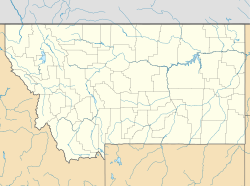Algeria Shrine Temple | |
 | |
| Location | Neill and Park Aves., Helena, Montana |
|---|---|
| Coordinates | 46°35′43″N112°2′21″W / 46.59528°N 112.03917°W |
| Area | 0.9 acres (0.36 ha) |
| Built | 1920 |
| Architect | Carsley, G.S.; Haire, C.S. |
| Architectural style | Exotic Revival, Moorish Revival |
| NRHP reference No. | 88000434 [1] |
| Added to NRHP | April 14, 1988 |
The historic Algeria Shrine Temple, now also known as the Helena Civic Center, is a Moorish Revival building in Helena, Montana that was built in 1920. The building served as a meeting hall for the Algeria Shriners and had civic functions. It was listed on the National Register of Historic Places (under the shrine name) in 1988. [1]
The National Register's database records "Historic subfunctions" that include "meeting hall" for the place. [1] Today, the building has a 1925-seat auditorium and a 15,000 sq. ft. ballroom/exhibition hall. As of 2012, it is owned and operated by the City of Helena and available for banquets, craft shows, dances, weddings, trade shows and conferences. [2]

